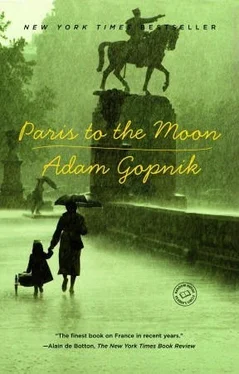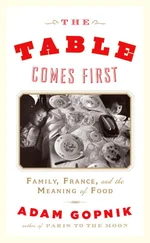BHV, in its current form, seems to have been invented by a Frenchman who visited an E. J. Korvette’s in Cherry Hill, New Jersey, sometime in the early 1960s and, maddened with love, decided to reproduce it down to the least detail. There’s the same smell of popcorn, the same cheery help, the same discount appliances stretching as far as the eye can see. It is the Parisian tradition that the landlord does not supply appliances. They must all be bought, and you take them with you when you leave. We had a whole run of things to buy, none of which, as lifelong Manhattan renters, we had ever had to buy before: a refrigerator, an oven, a stove. We had, oddly enough, once bought a wonderful French dishwasher, a Miele, silent as a Greek oracle, to add to our old loft. But we couldn’t use even this since most of the old appliances run on American 110 volts, and France uses 220 volts. You either have to get the insides of the machine changed or else buy something new.
We became hypnotized, bewitched by the curious selling rhythms of BHV: a mixture of confidence, arrogance, and an American-style straightforwardness, with the odd difference that here the customer is always, entirely wrong. We bought a toaster, which promptly shorted out the first time we used it. We brought it back. “What did you toast in it?” the return man asked, haughty for all that he was wearing a regulation oversize checked vest, the uniform of BHV. “Raisin brioche,” we answered honestly. He looked shocked, disgusted, appalled, though not surprised. “What do you expect if you put bread with raisins in it?” he asked. But he let us have a new one anyway.
The week before Christmas I had to go out to buy Christmas tree lights at the Bon Marche, the Left Bank department store. Ours didn’t work, for reasons I don’t understand, since a lot of the electric lamps we brought with us do work. Apparently some American lights shine in Paris, and some don’t, don’t ask why. (Henry James wrote whole novels on this theme, after all.) Instead of coming in strands that you can wrap around the tree, though, the French Christmas tree lights come in guirlandes— garlands—closed circles of lights without beginnings or endings. A thin cord with a plug at the end shoots out from the middle of the garland. (They cost a fortune too: twenty-five dollars for as many lights as you can get on Canal Street for five.) These garlands are packed into the box just the way strands are—light by light in little cardboard notches in a horizontal row—so it’s only when you take them out of the box that you realize that what you’ve got is a ring, not a rope.
This means that the only way to get the Christmas lights on the Christmas tree is to lasso it. You have to get up on a ladder, hold the lights out as a loop, and then, pitching forward a bit, throw the entire garland right over the top of the tree, rodeo style. This is harder to do than it sounds and even more dangerous than it looks. I suppose you could pick up the tree and shimmy the lights on from down below, like a pair of calecons, but this would require someone to pick up the tree so you could do it. I can’t really see the advantages of having a garland over a string. A string is easier to use—you just start at the bottom and wrap it right around the tree, merrily ascending—and this seems to me not cultural prejudice but a practical fact. (But then all cultural prejudices seem like practical facts to the prejudiced.) Still, the garlands are all there is. Martha kept sending me back to buy more.
Even then it wasn’t finished. I had had the pointed inspiration of buying blue lights for the Christmas tree this year, whereas in New York we always had white ones. Since we had moved, changed cultures, I couldn’t think of a better marker, a clearer declaration of difference and a new beginning, than having blue lights on the tree instead of white ones. But when I brought them home and did my Roy Rogers bit again and we turned them on and then turned off the lights in the living room, no one liked the look of them. The blue lights looked, well, blue. I doggedly, painstakingly packed them back into the box, took them back to the Bon Marche, and tried to exchange them for white lights.
The trouble now was that the new white lights I got were white lights that were all twinkling ones. I saw the word clignotant on the box, and I knew that it meant blinking, but somehow I didn’t associate the word blinking with the concept “These lights blink off and on.” It was the same thing with the garlands, come to think of it. It said guirlande right on the box, and I knew perfectly well what guirlande meant; but I am not yet able to make the transposition from what things say to what they mean. I saw the word guirlande on the box, but I didn’t quite believe it. In New York I believe everything I read, even if it appears in the New York Post. In France I am always prepared to give words the benefit of a poetic doubt. I see the word guirlande and shrug and think that maybe garland is just the French seasonal Christmas light-specific idiom for a string. The box says, “They blink,” and I think they don’t.
I found this out of course only after I had already put the lights on the tree, plugged them in, and watched them blinking. I liked the effect OK, but Martha was having none of it. She thought it looked horrible— sequiny and vulgar were her words—so back I went to Bon Marche on the afternoon of Christmas Eve, for the third time, to buy a garland of unblinking white lights. This time the saleswoman gave me a really hard time. It was bad enough not knowing what color you want, but not even knowing if you wanted shimmer or a solid glow? I got them home at last and felt unreasonably proud of the garland of lights: a closed circle, desire and fulfillment meeting in a neat French ring, and just shining.
For all the talk about globalization, the unification of the world through technology, etc., the truth is that only information is being globalized (and then only for people who speak English). There is a Regulon in the Semiosphere. It is called a plug. The necessities of life—plugs and voltages and battery types and… —are more compartmentalized, more provincialized, more exhaustingly different now from country to country from what they were a century or even two centuries ago. A chamber pot, after all, was always a chamber pot in whatever country you happened to be sitting; a pen was a pen since a feather was a feather. But to plug in your computer now takes a range of plugs and adapters—three prongs and two prongs and two small prongs with a big prong and three tiny prongs in a row—that look like sexual aids for jaded courtesans in de Sade. We are unified by our machines and divided up by the outlets we use to brancher them.
Fish, too. Fish and plugs are the two great differences, the two things that are never quite alike from country to country. Fish are sort of alike but maddeningly not exactly alike. You have to learn the translations. A bar is sort of but not quite a sea bass, a rouget like a red snapper but actually smaller and more dapper—weirdly snappier. A turbot is not a flounder. Even French oysters, the most delicious in the world, have a salty, sea brine, bracing taste, not better than plump, sweet American oysters, but different—far more different from the difference, real though it is, between French lamb and American, or a French chicken and a good American one.
Globalization stops short at the baseboard and the coastline, wherever the electricity and the seafood come charging in. The reason for the differences are plain enough. You can’t farm line-caught fish, and the variety of plugs is the consequence of the basic difference in the European decision to have 220-volt outlets where we have only 110. This means that the Europeans worry more about shocks. They add a third plug to ground the charge, the baseboard equivalent of a social safety net. Each one does it a little differently. The French have light, dapper, rounded three-prong plugs with two little cylindrical probes and a third, thicker one; the British have three immensely heavy prongs;
Читать дальше












